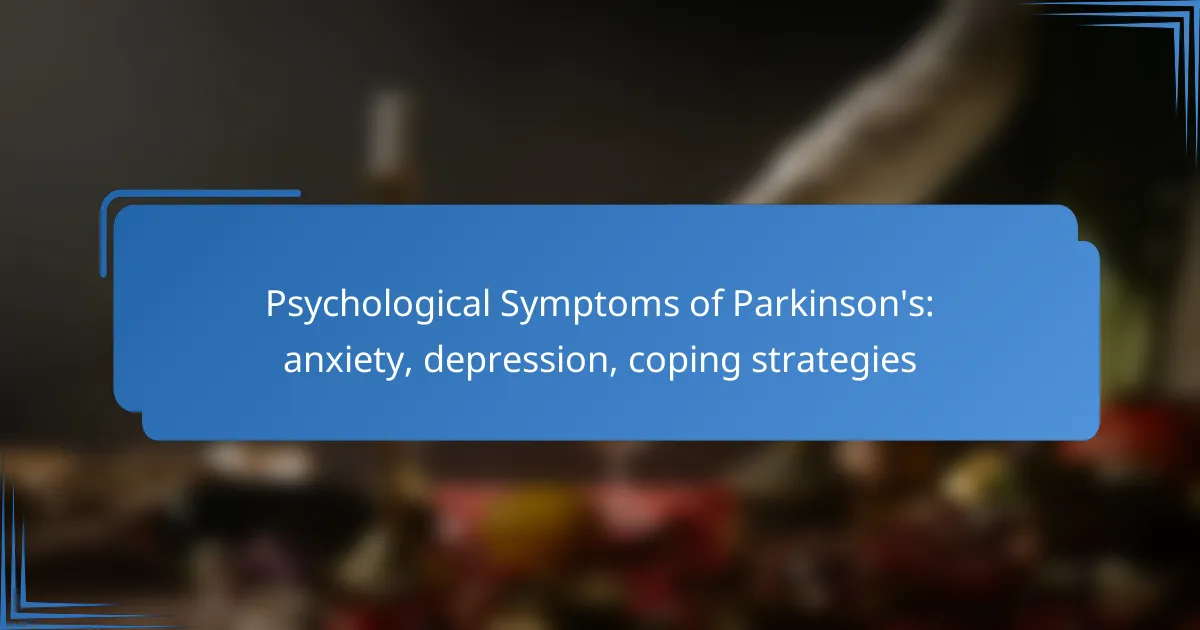Parkinson’s disease not only affects motor functions but also brings about significant psychological symptoms such as anxiety and depression. These challenges can greatly diminish the quality of life for those affected, making it crucial to identify and address them through effective coping strategies. Techniques such as therapy, support groups, and mindfulness practices can play a vital role in managing these symptoms and enhancing overall well-being.

What are the psychological symptoms of Parkinson’s in New Zealand?
The psychological symptoms of Parkinson’s disease in New Zealand include anxiety, depression, social withdrawal, and cognitive changes. These symptoms can significantly impact the quality of life for individuals living with Parkinson’s, making it essential to recognize and address them effectively.
Anxiety
Anxiety is a common psychological symptom experienced by individuals with Parkinson’s disease. It can manifest as excessive worry about health, daily activities, or the progression of the disease. This heightened state of anxiety may lead to physical symptoms such as increased heart rate and difficulty concentrating.
To manage anxiety, individuals can benefit from mindfulness practices, regular physical activity, and structured routines. Seeking support from mental health professionals can also provide coping strategies tailored to their specific needs.
Depression
Depression is prevalent among those with Parkinson’s, affecting mood, motivation, and overall well-being. Symptoms may include persistent sadness, loss of interest in activities, and feelings of hopelessness. It’s crucial to recognize that depression can occur independently of the physical symptoms of Parkinson’s.
Effective treatments for depression include psychotherapy, medication, and lifestyle changes such as engaging in social activities and maintaining a healthy diet. Support groups can also offer a sense of community and understanding.
Social withdrawal
Social withdrawal is a significant concern for individuals with Parkinson’s disease, often stemming from anxiety and depression. People may isolate themselves due to fear of judgment or difficulty participating in social situations. This withdrawal can exacerbate feelings of loneliness and depression.
Encouraging social interaction, even in small doses, can help combat withdrawal. Family and friends can play a vital role by inviting individuals to gatherings or activities, fostering a supportive environment that promotes engagement.
Cognitive changes
Cognitive changes in Parkinson’s can include difficulties with memory, attention, and problem-solving. These changes can be frustrating and may contribute to feelings of inadequacy or anxiety. It’s essential to understand that cognitive decline varies widely among individuals with Parkinson’s.
To cope with cognitive changes, individuals can use memory aids, establish routines, and engage in mentally stimulating activities. Consulting with healthcare providers for cognitive assessments and tailored interventions can also be beneficial.

How can anxiety be managed in Parkinson’s patients?
Anxiety in Parkinson’s patients can be effectively managed through various strategies, including therapy, medication, and mindfulness practices. These approaches help to alleviate symptoms and improve overall quality of life.
Cognitive-behavioral therapy
Cognitive-behavioral therapy (CBT) is a structured, goal-oriented form of psychotherapy that focuses on changing negative thought patterns and behaviors associated with anxiety. It helps patients identify triggers and develop coping strategies tailored to their specific experiences with Parkinson’s.
CBT typically involves weekly sessions lasting about 45-60 minutes, and can be conducted individually or in groups. Patients often find it beneficial to practice techniques learned in therapy during their daily routines, reinforcing their skills in real-life situations.
Medication options
Medications can play a crucial role in managing anxiety for Parkinson’s patients. Common options include selective serotonin reuptake inhibitors (SSRIs) and benzodiazepines, which can help reduce anxiety symptoms. It’s essential to work closely with a healthcare provider to determine the most suitable medication and dosage.
Patients should be aware of potential side effects and interactions with Parkinson’s medications. Regular follow-ups are important to monitor effectiveness and make necessary adjustments to the treatment plan.
Mindfulness practices
Mindfulness practices, such as meditation and deep-breathing exercises, can significantly reduce anxiety levels in Parkinson’s patients. These techniques promote relaxation and help individuals stay present, which can alleviate feelings of worry and stress.
Incorporating mindfulness into daily routines can be simple; even short sessions of 5-10 minutes can yield benefits. Patients may consider joining local classes or using mobile apps designed for guided mindfulness practices to enhance their experience.
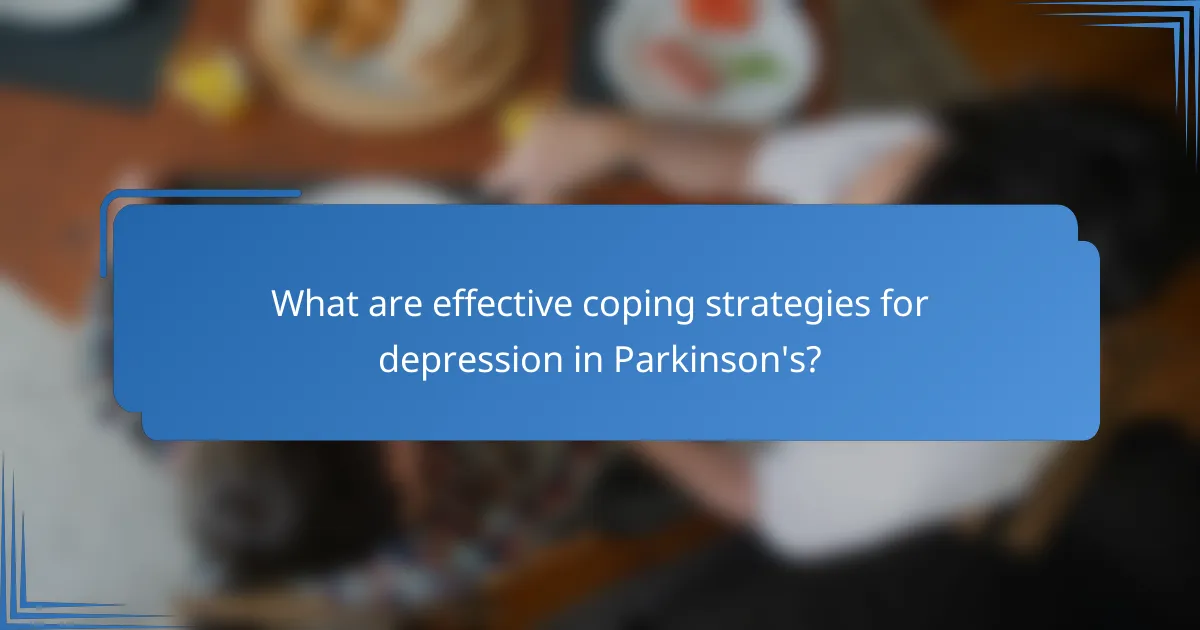
What are effective coping strategies for depression in Parkinson’s?
Effective coping strategies for depression in Parkinson’s include engaging in support groups, maintaining physical activity, and implementing healthy lifestyle changes. These approaches can help manage symptoms and improve overall well-being.
Support groups
Support groups provide a platform for individuals with Parkinson’s to share experiences and feelings, fostering a sense of community. Connecting with others facing similar challenges can reduce feelings of isolation and promote emotional resilience.
Consider joining local or online support groups tailored specifically for Parkinson’s patients. Many organizations, such as the Parkinson’s Foundation, offer resources to help find suitable groups.
Physical activity
Regular physical activity is crucial for managing depression in Parkinson’s. Exercise can enhance mood, increase energy levels, and improve overall physical health, which is particularly beneficial for those with Parkinson’s.
Activities such as walking, swimming, or yoga can be effective. Aim for at least 150 minutes of moderate exercise each week, adjusting based on individual capabilities and preferences.
Healthy lifestyle changes
Implementing healthy lifestyle changes can significantly impact mental health. A balanced diet rich in fruits, vegetables, whole grains, and lean proteins supports both physical and emotional well-being.
Additionally, prioritizing sleep hygiene and stress management techniques, such as mindfulness or meditation, can further alleviate symptoms of depression. Small changes, like reducing caffeine intake or establishing a consistent sleep schedule, can yield noticeable benefits.
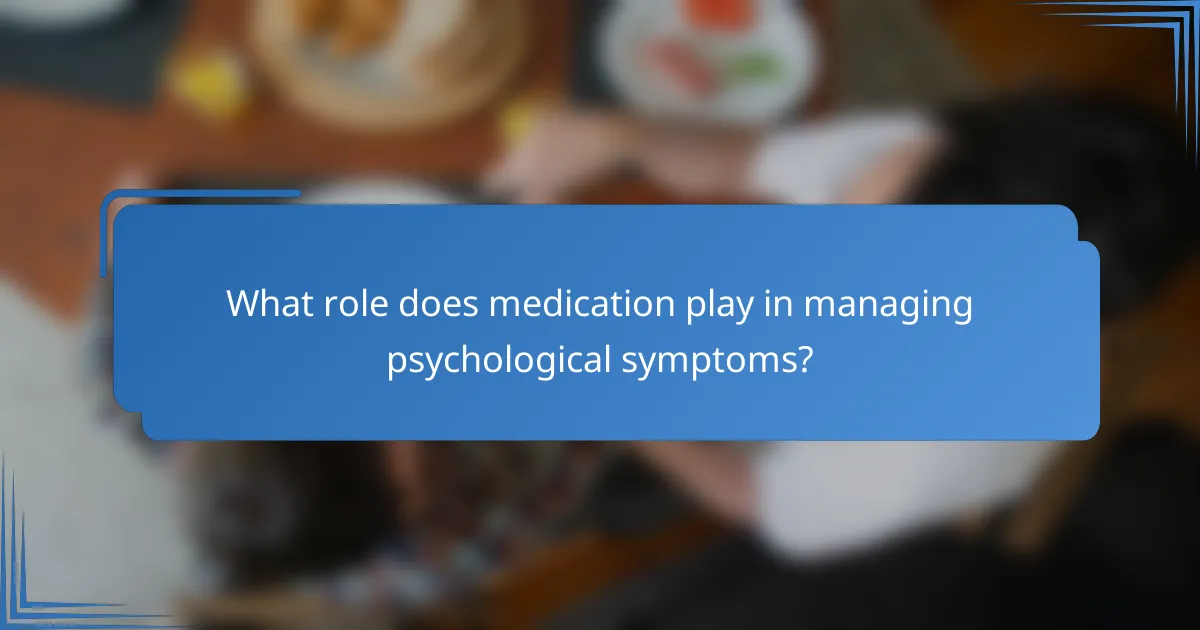
What role does medication play in managing psychological symptoms?
Medication plays a crucial role in managing psychological symptoms associated with Parkinson’s, such as anxiety and depression. These medications can help alleviate symptoms, improve quality of life, and support overall treatment plans.
Antidepressants
Antidepressants are commonly prescribed to address depression in individuals with Parkinson’s. Selective serotonin reuptake inhibitors (SSRIs) and serotonin-norepinephrine reuptake inhibitors (SNRIs) are often effective and can help balance neurotransmitters in the brain.
When considering antidepressants, it’s essential to monitor for potential side effects, which may include nausea, weight gain, or sleep disturbances. Regular follow-ups with a healthcare provider can help ensure the chosen medication is effective and well-tolerated.
Anti-anxiety medications
Anti-anxiety medications, such as benzodiazepines or buspirone, can be beneficial for managing anxiety symptoms in Parkinson’s patients. These medications work by enhancing the effects of a neurotransmitter called gamma-aminobutyric acid (GABA), which helps calm the nervous system.
While effective, anti-anxiety medications can lead to dependency if used long-term. It’s advisable to use them as a short-term solution while exploring other coping strategies, such as therapy or lifestyle changes, to manage anxiety more sustainably.
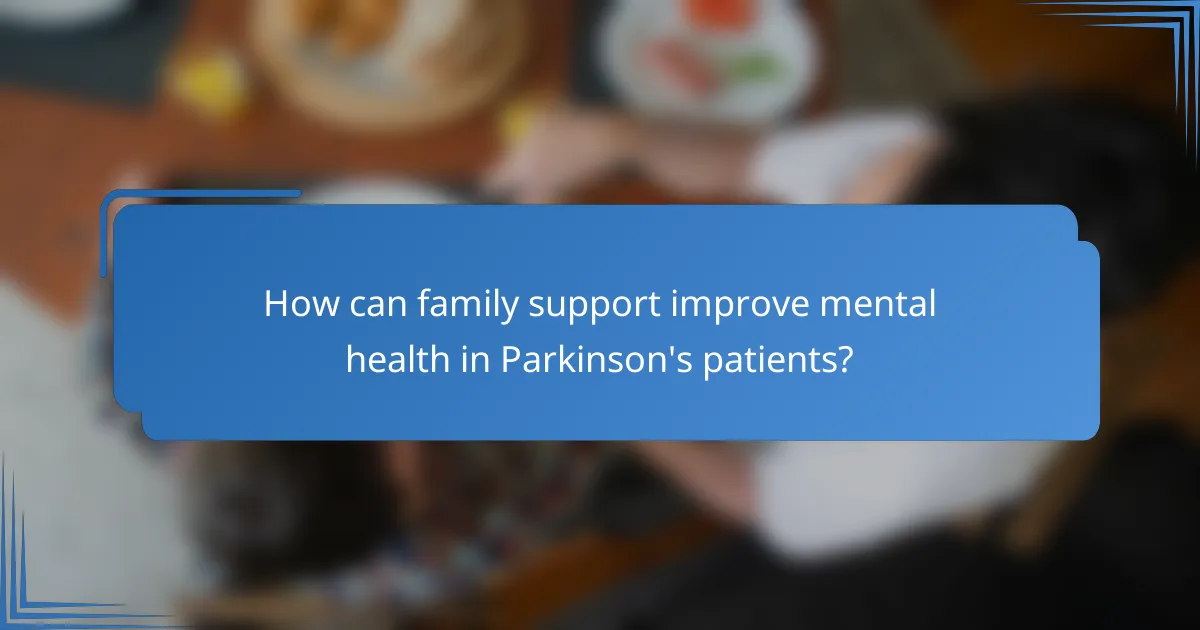
How can family support improve mental health in Parkinson’s patients?
Family support can significantly enhance the mental health of Parkinson’s patients by providing emotional reassurance and practical assistance. This support helps reduce feelings of isolation and anxiety, fostering a more positive outlook on life.
Emotional support
Emotional support from family members can alleviate feelings of anxiety and depression in Parkinson’s patients. Regular check-ins, active listening, and encouraging conversations about feelings can create a safe space for patients to express their concerns.
Family members can also participate in activities that promote mental well-being, such as engaging in hobbies together or attending support groups. This involvement not only strengthens relationships but also helps patients feel understood and valued.
Assistance with daily activities
Assisting with daily activities can significantly ease the burden on Parkinson’s patients, allowing them to maintain a sense of independence. Family members can help with tasks such as cooking, cleaning, and managing medications, which can reduce stress and improve overall quality of life.
It’s important for families to establish a routine that accommodates the patient’s needs while encouraging participation in manageable tasks. This balance can foster a sense of accomplishment and enhance self-esteem, which is crucial for mental health.
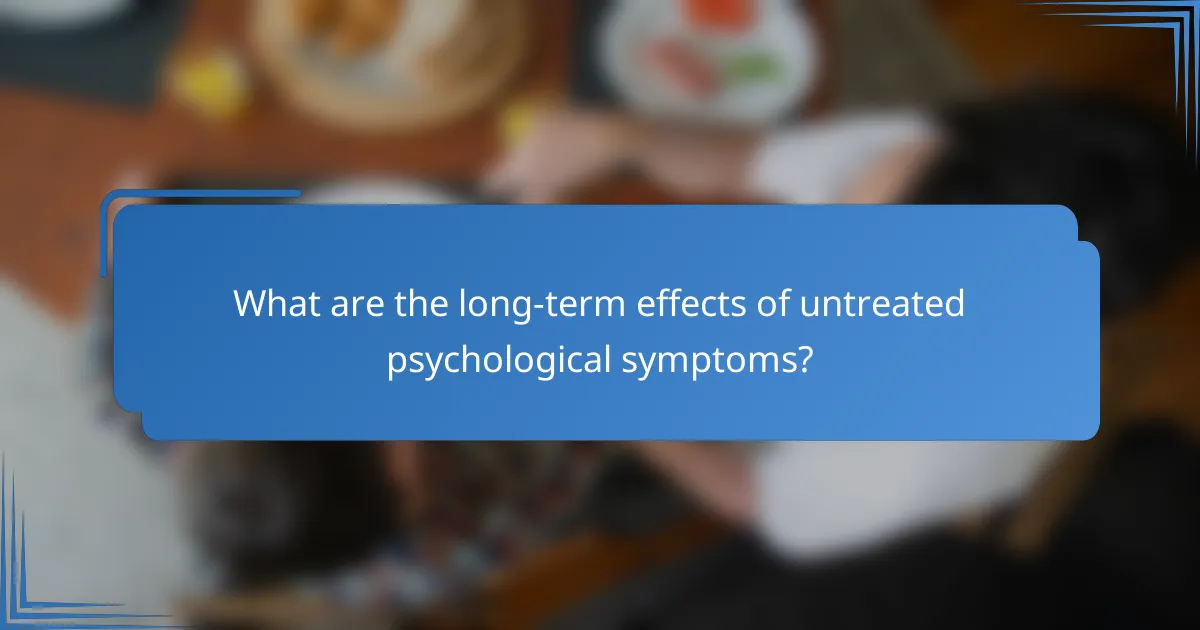
What are the long-term effects of untreated psychological symptoms?
Untreated psychological symptoms such as anxiety and depression can significantly worsen the overall condition of individuals with Parkinson’s disease. These symptoms can lead to a decline in both mental and physical health, impacting daily functioning and quality of life.
Worsening motor symptoms
Psychological symptoms like anxiety and depression can exacerbate motor symptoms in Parkinson’s patients. Stress and emotional distress may lead to increased muscle tension, which can hinder movement and coordination. This cycle can make it more challenging for individuals to manage their symptoms effectively.
For instance, a person experiencing heightened anxiety may find it difficult to initiate movement, leading to more pronounced tremors or stiffness. Addressing these psychological aspects is crucial for improving motor function and overall well-being.
Increased caregiver burden
When psychological symptoms remain untreated, caregivers often face increased stress and emotional strain. The challenges of managing a loved one’s anxiety or depression can lead to feelings of frustration, helplessness, and burnout. This heightened burden can strain relationships and reduce the quality of care provided.
Caregivers should be aware of their own mental health and seek support when needed. Establishing a support network and utilizing respite care can help alleviate some of the pressures associated with caregiving, allowing for better management of both the caregiver’s and the patient’s needs.

What resources are available for mental health support in New Zealand?
In New Zealand, individuals seeking mental health support for conditions like anxiety and depression related to Parkinson’s can access various resources. These include government-funded services, community organizations, and private practitioners that offer counseling and therapy.
Government-funded services
The New Zealand government provides mental health services through the District Health Boards (DHBs). These services are often free or low-cost for residents and include access to mental health professionals, support groups, and crisis intervention services. Contact your local DHB for specific offerings in your area.
Community organizations
Several community organizations focus on mental health support, such as the Mental Health Foundation of New Zealand and Parkinson’s New Zealand. These organizations offer resources, workshops, and peer support groups tailored to individuals with Parkinson’s and their families, helping them cope with emotional challenges.
Private practitioners
For those preferring personalized care, private practitioners, including psychologists and counselors, are available throughout New Zealand. While fees can vary, many practitioners offer sliding scale options based on income. It’s advisable to check if they have experience with Parkinson’s-related mental health issues for the most effective support.
